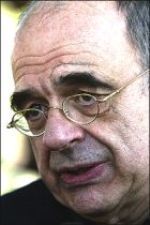U.N. envoy says horrified by fresh Darfur attacks
By Opheera McDoom
KHARTOUM, Feb 2, 2005 (Reuters) – The top U.N. envoy in Sudan said he was horrified by fresh attacks in Darfur and urged both sides on Wednesday to stop fighting this month and conclude a peace agreement by the end of the year.

|
|
Jan pronk, top U.N. envoy in Sudan |
“Stop the fighting in February. Talk 10 months…but you should not give yourselves 10 years,” envoy Jan Pronk said, referring a separate deal to end more than 20 years of civil war in southern Sudan signed last month after a decade of talks.
He told reporters that last week he visited the Labado area in the east of South Darfur state, which saw fierce fighting between the government and rebels in December, followed by what Pronk called a “systematic pattern” of attacks by militias on civilian villages in which many people died.
“I was horrified by what I saw in Labado. All huts had been demolished and burnt down… All water wells have been destroyed,” he said. Militias had destroyed dozens of villages around the town in a similar manner, he added.
He said the African Union (AU) summit to be held in Khartoum in January 2006 should be an incentive to achieve peace before receiving the presidents from more than 50 nations to Sudan.
Pronk was speaking two days after an independent commission of inquiry, in a report to the United Nations, stopped short of the U.S. assessment that there has been genocide in Darfur.
But it said government and military officials and allied Arab militia leaders were responsible for widespread abuses which may constitute crimes against humanity.
Tens of thousands of people have been killed in the two-year-old rebellion and more than 1.8 million have fled their homes. Thousands die every month in camps for the displaced.
Pronk said one of the most worrying points of the report was that these human rights abuses were continuing during the investigation, between November and January.
After years of conflict over scarce resources in Darfur, two main rebel groups took up arms in early 2003 accusing Khartoum of neglect and of giving preferential treatment to Arab tribes. They say the government mobilised Arab militias, known as Janjaweed, to loot and burn non-Arab villages.
The government says it armed some militias to fight the rebels but denies links to the Janjaweed, calling them outlaws.
Darfur rebels are accused of killing a nephew of a man who tops the U.S. State Department’s list of suspected Janjaweed leaders who stand accused of human rights abuses in Darfur.
Relatives of the victim, who declined to be named, said rebels ambushed one of the sons of Musa Hilal’s brother, Omar Hilal, three days ago, killing him and a friend in North Darfur state.
Throughout the Darfur conflict the government has been accused of bombing villages and Pronk on Wednesday asked Khartoum to stop flying its planes over civilian areas.
“I have requested the government to refrain from flying over areas where civilians live because they get very afraid and it creates the impression that there is coordination,” he said.
He was referring to suspicions that the Sudanese air force has acted in collusion with Arab militias accused of attacking non-Arab villages on the ground.
“The government should avoid creating that impression by restraining itself and refraining from flying,” he added.
There was no immediate response from the Sudanese government but officials have said in the past that the flights are for observation and to move troops around.
On the AU truce observers, Pronk said: “I saw…that they (the troops) are excellent. My appeal is: ‘You are so good. Come with many more’,” he said. The AU says building the bases for the troops has caused the delay to the deployment.
